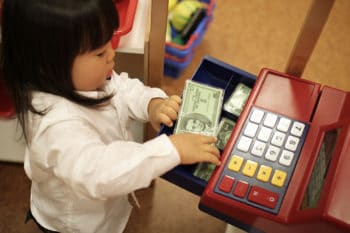
And it’s extremely important – kids that take a personal finance course are more likely to save, more likely to pay their bills on time, and less likely to max out their credit cards or carry credit card debt as they get older. In other words, learning about personal finance early is a great way to encourage good financial habits later in life. How do we teach our kids what they need to know?
Start Young
One great way to introduce kids to money and money management is to give them an allowance. It can be small – a couple of bucks a week is a big deal for a kindergartner. Talk to them about what money is and what it’s for. Explain to them that they can save it up for something big or buy something small right away and that the choice is theirs – but that they won’t get any more until their next scheduled allowance. That helps kids understand that money is finite and valuable and that they need to think carefully about how to use it.
As your kids get older, consider taking them to set up a savings or checking account. Many banks will let you set up an account with as little as $25 and with no fees. You can talk to your child about how banking works and how to move money in and out of the account. This may also be a good time to start working on good debit card habits – like always tracking how much is in your account so you don’t overdraft it.
Middle School and High School
As kids get older, they’ll be more and more able to grasp important personal finance concepts and form good financial habits. Keep up the allowance so they continually have to deal with money management. You can also start talking to them about other financial issues – paying bills, getting loans, and more. We often feel uncomfortable talking about money, especially with our kids, but it’s a great learning opportunity.
Many kids will start working in high school, so you can also take that opportunity to help them set up a budget (and a bank account, if they don’t have one). Help them stick to their budget, but don’t be afraid to let them fail. Not being able to afford a ticket for a movie with your friends is a pretty good motivator for staying on budget going forward – and it’s a lot better to learn that at 15 than at 30 when you can’t pay your mortgage.
If you go to buy a car or rent or buy a new home, consider taking your child along. Let them see how the process works and learn about down payments, security deposits, interests, and other aspects of those major transactions. By the time your child is ready to leave home and rent their own place or take out student loans, you’ll be glad they have the exposure and experience to make smart financial decisions.
Consider Credit Cards
Credit cards can be a dangerous thing in the hands of a teenager – they don’t always have the best impulse control. But getting them a credit card early is a great way to start building a credit history, which will make their financial future much smoother. If you do decide to get your kid a card, make sure you have a serious discussion about how it works, why they need to pay on time and in full, and that the card is their responsibility.
Know that they may very well get off track at some point and not be able to pay. You’ll have to make a call about whether to cover the shortfall or let them deal with the credit consequences (and interest payments) on their own. That will just depend on what you feel is right for you and your child.
Take Formal Classes, If Possible
One of the best ways for your kids to learn good financial habits is to take a formal class. If their high school or middle school offers one, encourage them to take it. That kind of class can cover issues that you might not come across in your day-to-day life and can offer activities and exercises to help make key financial concepts clear.
If there isn’t an option like that at school, consider signing your kid up for a personal finance course. There are a number of resources online (many of them free) and you may also be able to find that kind of class at your community center or local colleges.
Set Them Up For Success
It’s not easy to cultivate good financial habits – many of us struggle to create and stick to our budgets. But by starting early, your kids will have a much better chance for good financial health going forward. Lastly, I often tell clients of mine that are struggling with debt to include their teenagers in the discussions about how to solve the problems. Parents are often surprised what their kids are willing to sacrifice once they know the severity of the situation. These can be teachable moments with real life applications that provide lifetime lessons for each family member no matter how young.
Image Credit and License
